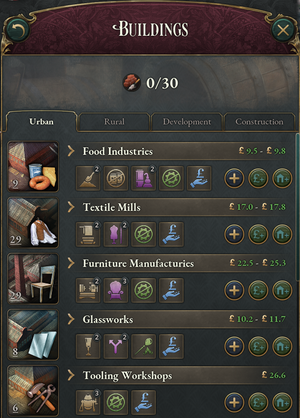Buildings are a place where pops work to produce resources such as goods.
Buildings generally do not represent a single building, but rather a wide range of industries, businesses and government functions, ranging from humble subsistence farms to complex motor industries and sprawling financial districts. For example, a single level of government administration represents the necessary buildings and infrastructure to support a certain number of bureaucrats.
Buildings always need qualified pops to work in them to yield any benefit, and an empty building is just that -- empty and completely useless. This holds true even for buildings like railroads and ports.
建造
建筑在地区内存在并建造。大多数建筑是直接建造的,而少数建筑根据某种条件自动创建。建造建筑时,建造部门需要消耗人力和商品,其成本取决于市场价格。
虽然在技术上一个地区内可建造的建筑数量没有限制,但是出于模拟和合理性的要求,建筑物本身的不同限制其最大数量。比如很多资源建筑受到当地资源潜力的限制,农业建筑数量不能超过当地最大可耕土地。类似的,城镇建筑(如工厂)受限于当地人数,以模拟城市人口更加密集的特点。
建筑类别
一般来说,建筑可以分为以下几类:
- 自给建筑 - 自给建筑是一种特殊的低效率建筑,不能被手动建造或者摧毁,但是会在世界上任何未使用的可耕土地存在。游戏开始时,世界上的绝大多数人口都以
 自给农的职业在自给建筑工作。私人所有制下,自给建筑还会提供
自给农的职业在自给建筑工作。私人所有制下,自给建筑还会提供  教士和
教士和  贵族的岗位。在自给建筑中工作的人口对GDP和税收贡献甚微,游戏进行工业化的过程中,会为自给农提供更有生产力的就业机会。
贵族的岗位。在自给建筑中工作的人口对GDP和税收贡献甚微,游戏进行工业化的过程中,会为自给农提供更有生产力的就业机会。
- 城镇中心 - 另一种特殊建筑,类似自给建筑,这些建筑是自动创建而非手动建造的。一个地区的城镇中心等级与其本地建筑产生的城镇化程度相关,每有100城镇化就会创建一级城镇中心。城镇中心主要提供
 店主和
店主和  教士岗位,并生产
教士岗位,并生产 服务。
服务。
- 私有建筑 - 绝大多数建筑都属于私有建筑,包括广泛的行业,例如农场、种植园、矿山和工厂。与政府建筑不同的是,私有建筑不是由国家所有,而是由
 资本家和
资本家和  贵族所有。所有者获得私有建筑的利润并为员工支付工资。需要注意的是,在不同所有制下,私有建筑的所有权可能完全不同。
贵族所有。所有者获得私有建筑的利润并为员工支付工资。需要注意的是,在不同所有制下,私有建筑的所有权可能完全不同。
- 开发建筑 - 开发建筑往往是政府建筑,但并非总是如此。开发建筑提供特殊的地区功能,比如,从当地居民中招募和训练士兵的兵营或为其他建筑物提供将商品推向市场所需的基础设施的铁路。
Managing buildings
To ease the management of all the different buildings (and their associated production methods) in the country the player can refer to the buildings panel.
The panel provides a birds-eye view of all industries in the country and see at a glance how they're doing financially. The buildings are organized by major and minor type and can be broken down further to view the individual building in each state with the possibility of clicking on one to get an in-depth view of its balance sheet and workforce. In addition, the panel allows adjusting the production methods of an individual building or set all production methods for a certain building type to a specific setting all across the country.
Predictive tooltips will explain the anticipated impact on the building's balance as a result of changes in production, consumption, and wage requirements, as well as the changes in employment (which new job positions will be created and which will disappear) that could also impact the country's politics over time. A warning will be provided if there aren't enough qualifying pops to take on any new professions created, as this could limit the industry's effectiveness.
Throughput
Throughput is a measure of how effective a workforce can turn input goods into output goods. It is a percent bonus to production applied to the amount of output goods created at no extra cost of input good.
Throughput is often positively modified by the economy of scale or by technology, and can be negatively modified by things like devastation, going into default or by a shortage of input goods.
